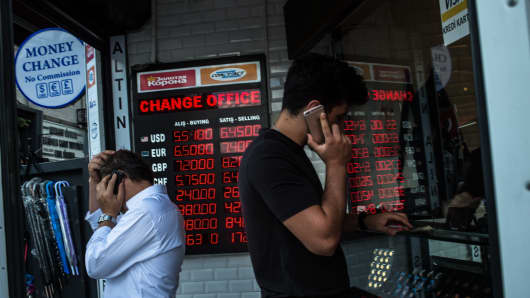After hitting new record low, Turkish lira pares some losses on central bank statements

The Turkish lira retraced some losses after touching a new record low in Asia’s Monday trade following a recent geopolitics-triggered free fall in the currency.
On Monday, the lira last traded down by around 3.5 percent against the greenback at 6.6475 at 2:30 p.m. HK/SIN. It had earlier dropped to a fresh all-time low of 7.24, before paring some losses after moves were taken to assuage market nerves frayed by the currency’s recent weakness.
The retracement in losses came after the Turkish central bank moved to improve liquidity during Asia afternoon trade. Among the moves announced Monday were a slashing of lira required reserves held by banks by 250 basis points for all maturities, Reuters said.
Before that, Finance Minister Berat Albayrak had said in a Sunday interview with local media outlet Hurriyet that the government had a plan in place following the fall in the lira, Reuters reported. Albayrak said Turkish institutions will take “necessary steps” beginning Monday, but the news agency said few specifics had been provided on what those steps included.
The lira briefly plunged 20 percent against the dollar on Friday, finishing the U.S. session lower by some 16 percent after U.S. President Donald Trump said he had approved metals tariffs on Turkey to be doubled.
The weakness in the lira came against the backdrop of the Turkish economy facing major challenges, but it has come under pressure most recently after U.S.-Turkey talks over the detention of a U.S. pastor in Turkey appeared to make no major progress.
“The decline in the lira is multifaceted, caused not only by a weak external position in terms of current account deficit and inadequate currency reserves, but also the challenging political environment which exacerbates the vulnerabilities in the lira,” Kerry Craig, global market strategist at J.P. Morgan Asset Management, wrote in a recent note.
“A mid-meeting rate hike and tightening of monetary policy may help to avert the lira’s decline, to some extent,” he added.
After calling for citizens to convert out of dollars and gold and buy the lira to help fight a “national struggle” last week, Turkish President Recep Erdogan said Sunday that the drop in the currency was not an accurate reflection of the country’s fundamentals, Reuters said.
“There is no economic reason … This is called carrying out an operation against Turkey,” Erdogan said, based on a translation.
Although sentiment in the wake of the lira’s plunge has been cautious, the turmoil in Turkey is not widely seen by analysts as posing a significant contagion risk for a broader financial crisis due to the confluence of factors that have resulted in the drop in the lira.
“[T]he drivers of the lira’s decline are very specific to Turkey — therefore it should not derail the positive fundamentals in other emerging markets over a longer term,” Craig said.
Still, some think the crisis could have a degree of fallout in the short term.
“While Turkey does not reflect any endemic risk amongst emerging markets, there could still be some sentiment spillovers into (emerging market) currencies and risky assets in the near term,” Chang Wei Liang, a strategist at Mizuho Bank, said in a note.
[“Source-cnbc”]

